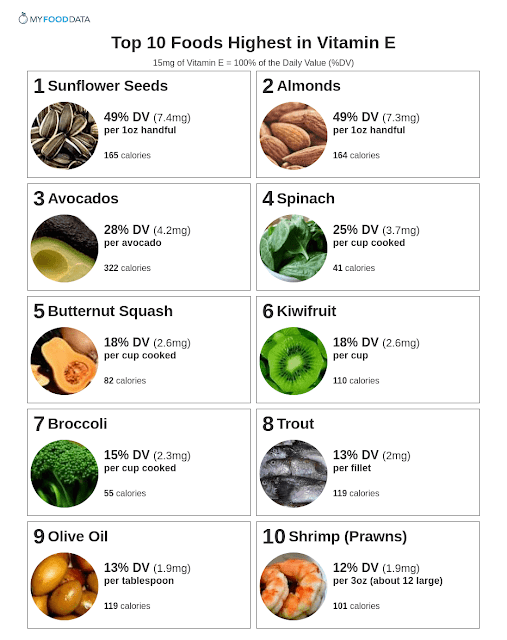Vitamin E is an effective antioxidant that helps preserve the body's cells, boosts immunity, lends a hand in protecting against certain chronic diseases, keeps our skin vibrant and helps maintain eye health. Unfortunately, like every other vitamin, is not spared by shysters and con artists who attempt to dupe people into buying dubious supplements that don't work. These deceivers claim - with no evidence - that Vitamin E supplements cure or treat everything from coronary artery disease, cancer, serious eye disorders and cognitive decline, just to name a few. Below is the latest hard science, followed by a graphic of REAL Vitamin E foods.
Bad news and reviews for Vitamin E supplements from major clinical trials:
Cataracts - From the journal Ophthalmology: "The data from a large trial of apparently healthy female health professionals with 9.7 years of treatment and follow-up indicate that 600 IU natural-source vitamin E taken every other day provides no benefit for age-related cataract or subtypes.”
Strokes - From the British Medical Journal: “In this meta-analysis, vitamin E increased the risk for haemorrhagic stroke by 22% and reduced the risk of ischaemic stroke by 10%. This differential risk pattern is obscured when looking at total stroke. Given the relatively small risk reduction of ischaemic stroke and the generally more severe outcome of haemorrhagic stroke, indiscriminate widespread use of vitamin E should be cautioned against.”
Cancer - From the Journal of the American Medical Association: “Dietary supplementation with vitamin E significantly increased the risk of prostate cancer among healthy men.”
Diabetes - From PLoS One: “In conclusion, there is currently insufficient evidence to support a potential beneficial effect of vitamin E supplementation on improvements of HbA1c [hemoglobin A1c] and fasting glucose and insulin concentrations in subjects with T2DM [type 2 diabetes mellitus].”
Death - From the journal Cardiovasc Drugs and Therapy: “The evidence from pooled analysis of 18 randomised controlled trials undertaken in apparently healthy people shows no effect of vitamin E supplementation at a dose of 23-800 IU/day on all-cause mortality.”
Blood Pressure - Journal of Human Hypertension: "This meta-analysis suggested that vitamin E supplements decreased only SBP [systolic blood pressure] and had no favorable effect on DBP [diastolic blood pressure] and MAP [mean arterial pressure].”
Good News
Alzheimer’s disease- JAMA Neurology: "Higher intake of foods rich in vitamin E may modestly reduce long-term risk of dementia and AD [Alzheimer’s disease].”
Inflammation - The European Journal of Clinical Nutrition: “The results of this meta-analysis suggest that supplementation with vitamin E in the form of either α-tocopherol or γ-tocopherol would reduce serum CRP [C-reactive protein, a measure of chronic inflammation] levels.”
From the National Institutes of Health (https://www.nih.gov/) in 2021:
“In general, clinical trials have not provided evidence that routine use of vitamin E supplements prevents cardiovascular disease or reduces its morbidity and mortality. However, participants in these studies have been largely middle-aged or elderly individuals with demonstrated heart disease or risk factors for heart disease. Some researchers have suggested that understanding the potential utility of vitamin E in preventing CHD [coronary heart disease] might require longer studies in younger participants taking higher doses of the supplement. Further research is needed to determine whether supplemental vitamin E has any protective value for younger, healthier people at no obvious risk of CHD.
“Evidence to date is insufficient to support taking vitamin E to prevent cancer. In fact, daily use of large-dose vitamin E supplements (400 IU of synthetic vitamin E [180 mg]) may increase the risk of prostate cancer.
“Overall, the available evidence is inconsistent with respect to whether vitamin E supplements, taken alone or in combination with other antioxidants, can reduce the risk of developing AMD [age-related macular degeneration] or cataracts. However, the formulations of vitamin E, other antioxidants, zinc, and copper used in AREDS [Age-Related Eye Disease Study] hold promise for slowing the progression of AMD in people at high risk of developing advanced AMD.
“In summary, most research results do not support the use of vitamin E supplements by healthy or mildly impaired individuals to maintain cognitive performance or slow its decline with normal aging. More research is needed to identify the role of vitamin E, if any, in the management of cognitive impairment.”
Sources
A Scientific Look at Alternative Medicine: Dietary Supplements Part 2 https://sites.google.com/site/kycahf/supplements/supplements-part-2
Top 10 Foods Highest in Vitamin E https://www.myfooddata.com/articles/vitamin-e-foods.php
Related Posts
Prevagen: The Pitiful, Pathetic Deceit & Dishonesty Of Memory Supplement Claims https://www.mybestbuddymedia.com/2022/04/prevagen-pitiful-pathetic-deceit.html
Stronger Bones & Cancer Prevention? The Great Vitamin D Scam https://www.mybestbuddymedia.com/2018/10/stronger-bones-cancer-prevention-great.html
Supplemental Madness: Still More Evidence For The Uselessness Of Dietary Supplements http://www.mybestbuddymedia.com/2018/07/supplemental-madness-still-more.html
Walmart, Target & Alex Jones: Supplement Rip-Offs That Harm Your Health & Wallet http://www.mybestbuddymedia.com/2018/05/walmart-target-alex-jones-supplement.html
Enough Already! The Great Dietary Supplement Scam http://www.mybestbuddymedia.com/2016/12/enough-already-great-dietary-supplement.html
8 Alarming Truths That Make Supplement Marketers Squirm http://www.mybestbuddymedia.com/2016/08/8-alarming-truths-that-make-supplement.html
Do Supplements Really Work? 8 Crucial Guidelines http://www.mybestbuddymedia.com/2013/10/do-supplements-really-work-8-crucial.html
19 Vitamin & Mineral Supplements: What Works And What’s Bogus http://www.mybestbuddymedia.com/2014/09/19-vitamin-mineral-supplements.html
9 Quick Ways to Detect Online Supplement Scams http://www.mybestbuddymedia.com/2015/06/9-quick-ways-to-detect-online.html
Testosterone Supplement Hype: Misguided Masculinity http://www.mybestbuddymedia.com/2014/11/testosterone-supplement-hype-misguided.html











.jpg)











0 comments :
Post a Comment
Feel free to leave any comments...